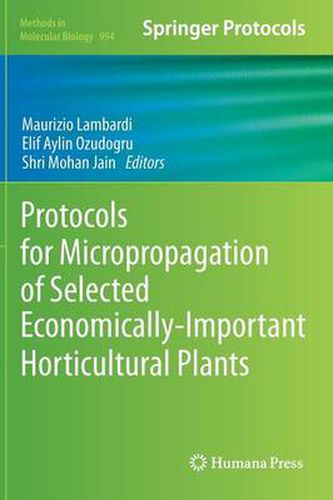Readings Newsletter
Become a Readings Member to make your shopping experience even easier.
Sign in or sign up for free!
You’re not far away from qualifying for FREE standard shipping within Australia
You’ve qualified for FREE standard shipping within Australia
The cart is loading…






This title is printed to order. This book may have been self-published. If so, we cannot guarantee the quality of the content. In the main most books will have gone through the editing process however some may not. We therefore suggest that you be aware of this before ordering this book. If in doubt check either the author or publisher’s details as we are unable to accept any returns unless they are faulty. Please contact us if you have any questions.
Micropropagation is a reliable technology applied commercially worldwide for large-scale plant multiplication, germplasm conservation, pathogen elimination, genetic manipulations and supply of selected plants. In Protocols for Micropropagation of Selected Economically-Important Horticultural Plants, well recognised researchers in the field compile step-wise protocols for rapid plant multiplication of economically-important horticultural species. The book contains 35 chapters, divided into four major sections. The first three sections (Section A, B and C) contain 29 micropropagation protocols of selected fruit and nut species, indoor and outdoor ornamental plants, cut flowers, and vegetables. In addition to the detailed protocols of in vitro shoot initiation, proliferation, root induction and acclimatization, chapters also include detailed information on medium preparation, explant selection and preparation. The six chapters of Section D cover specific reviews on pivotal topics, such as in vitro rejuvenation, synthetic seed technology, thermotherapy and meristem culture in banana, genetic transformation of pineapple, flower color somaclonal variation in torenia, and cryotherapy of horticultural crops. Moreover, as a part of the highly successful Methods in Molecular Biology series, chapters include introductions to the respective topic, lists of necessary materials, notes, and illustrative photos.
Comprehensive and well-written, Protocols for Micropropagation of Selected Economically-Important Horticultural Plants offers a useful resource for horticulturists, researchers, commercial companies, plant propagators, biotechnologists and students interested in micropropagation.
$9.00 standard shipping within Australia
FREE standard shipping within Australia for orders over $100.00
Express & International shipping calculated at checkout
This title is printed to order. This book may have been self-published. If so, we cannot guarantee the quality of the content. In the main most books will have gone through the editing process however some may not. We therefore suggest that you be aware of this before ordering this book. If in doubt check either the author or publisher’s details as we are unable to accept any returns unless they are faulty. Please contact us if you have any questions.
Micropropagation is a reliable technology applied commercially worldwide for large-scale plant multiplication, germplasm conservation, pathogen elimination, genetic manipulations and supply of selected plants. In Protocols for Micropropagation of Selected Economically-Important Horticultural Plants, well recognised researchers in the field compile step-wise protocols for rapid plant multiplication of economically-important horticultural species. The book contains 35 chapters, divided into four major sections. The first three sections (Section A, B and C) contain 29 micropropagation protocols of selected fruit and nut species, indoor and outdoor ornamental plants, cut flowers, and vegetables. In addition to the detailed protocols of in vitro shoot initiation, proliferation, root induction and acclimatization, chapters also include detailed information on medium preparation, explant selection and preparation. The six chapters of Section D cover specific reviews on pivotal topics, such as in vitro rejuvenation, synthetic seed technology, thermotherapy and meristem culture in banana, genetic transformation of pineapple, flower color somaclonal variation in torenia, and cryotherapy of horticultural crops. Moreover, as a part of the highly successful Methods in Molecular Biology series, chapters include introductions to the respective topic, lists of necessary materials, notes, and illustrative photos.
Comprehensive and well-written, Protocols for Micropropagation of Selected Economically-Important Horticultural Plants offers a useful resource for horticulturists, researchers, commercial companies, plant propagators, biotechnologists and students interested in micropropagation.